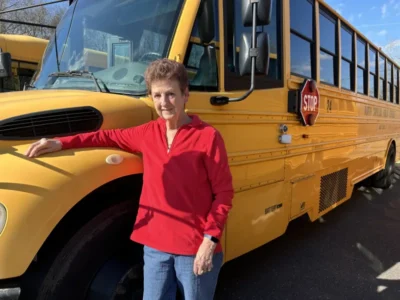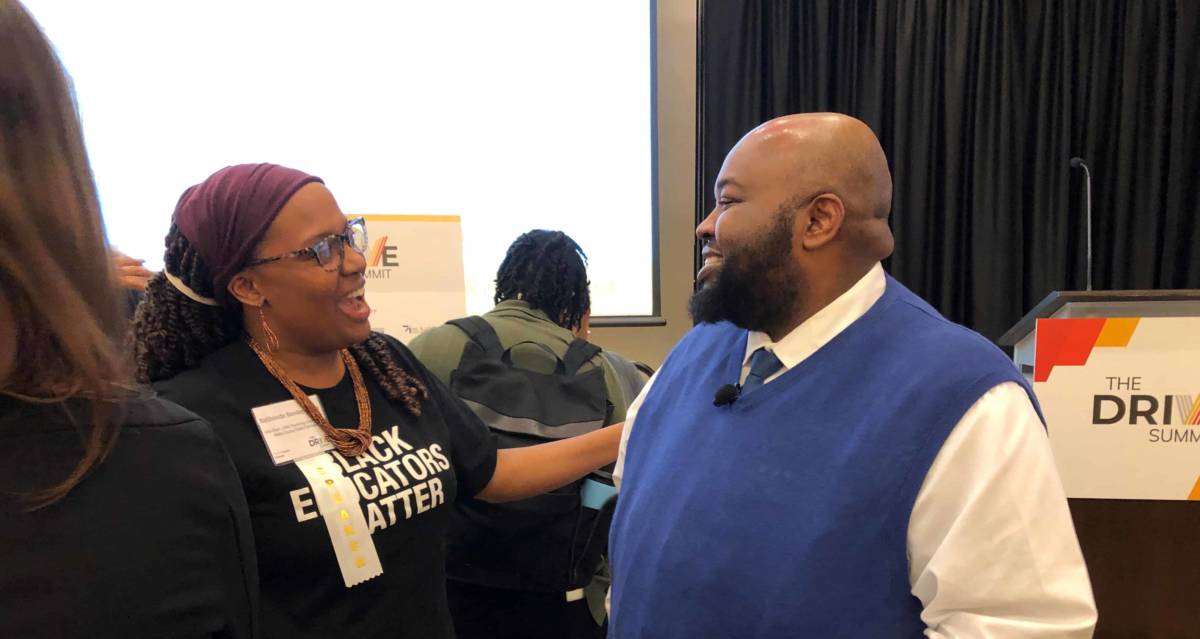North Carolina aspires to be “first in the nation in a diversified workforce in a high-achieving public school system,” said Eric Davis, chair of the State Board of Education at the DRIVE Summit today.
“Kids aren’t at risk,” said Dr. Aaliyah Samuel, who moderated a panel on the impact of educators of color. “They’re at possibility.” Building a pipeline for educators of color is emerging as a key strategy in North Carolina for student success.
The Office of Gov. Roy Cooper, The Hunt Institute, and the NC Business Committee for Education held the DRIVE Summit at Talley Student Union at N.C. State. DRIVE stands for Developing a Representative & Inclusive Vision for Education, and the stated goal is for the state to move towards a new landscape in recruiting, developing, supporting, and retaining educators of color in North Carolina.
In the 2015-16 school year, North Carolina’s public school student population became “majority-minority” for the first time as the number of students of color exceeded the number of white students.
Data from the 2018-19 school year indicate that while 53 percent of students are nonwhite, this is true of only 22 percent of educators.
Two LEAs employ zero educators of color, and 23 LEAs do not employ a principal or assistant principal of color.
— Issue Brief, The DRIVE Summit
Throughout the day, Reach NC Voices powered live audience engagement via text message. Here’s who responded.
“Research shows that all students, and particularly students of color, are more successful when they have diverse and representative teachers leading their classrooms,” writes Gov. Cooper in the summit’s welcome letter. “Unfortunately, North Carolina has not been able to develop and recruit enough teachers of color into our public schools.”
.@NC_Governor says we’ve lost two of our best recruiters for teachers: parents and current teachers. “We need to be lifting up this profession, saying we value it.” #DRIVEsummit pic.twitter.com/ZDq7y7I8Ul
— Molly Osborne Urquhart (@mosborne917) December 10, 2019
“I challenge all of you here today to work together to develop strategies to ensure more equitable representation of educators in classrooms across North Carolina.” — Gov. Roy Cooper
The day before the summit, the governor established by executive order a DRIVE Task Force “to tackle the issue and measure goals to get to the kind of workforce we need for every child to have a chance.”
Understanding the issue
The history of race and ethnic diversity in public education
Deep Rooted: A Brief History of Race and Education in North Carolina
“What you do today will help affirm a lot of kids across North Carolina and build a better North Carolina,” said Rep. Zack Hawkins, D-Durham, introducing the panel on the history of race and ethnic diversity in public education.
James Ford, member of the State Board of Education and executive director of CREED (the Center for Racial Equity in Education), moderated the panel including Dr. Dudley Flood, former associate state superintendent; Howard Lee, former chair of the State Board of Education; and Frances Cummings, former state representative and former president of the North Carolina Association of Educators (NCAE).
The panel kicked off with stories about what brought them to the field of education, then discussed how recruiting, preparing, and retaining educators of color is radically different today than in the past, before tackling racism head-on.
“You have to be determined to make a difference,” said Cummings to educators of color. “Be the best you can be. The best there is.”
What makes that even harder today, said Lee, is parents are less involved, more students are taking drugs, and students and teachers have to be concerned about gun violence in our schools. Lee said this requires educators to ask, “How much can I give of myself when my government and my leader don’t pay much attention to my pay?”
“I think one of the greatest things that happened in my life is that I went through a bad segregated school,” says the Hon. Howard Lee. He goes to say the reason is because of the teachers he had in that school. #DRIVEsummit
— Molly Osborne Urquhart (@mosborne917) December 10, 2019
Roughly half of the audience said they had their first teacher of color in elementary school, while 7% said they never had a teacher of color.
Looking to the evidence: The impact of educators of color
Aaliyah Samuel, vice president of policy and advocacy for Northwest Evaluation Association, left the classroom when she saw that her school administrators had posted a photo of Buckwheat from the Little Rascals as her childhood photo.
Samuel moderated a panel on the evidence of the impact of teachers of color, which included Dr. Anna Egalite, assistant professor at N.C. State; Dr. Constance Lindsay, assistant professor at UNC-Chapel Hill; and Mireya Ruiz, a teacher at Lake Myra Elementary School.
Egalite and Lindsay shared the results of their research, showing that having teachers of the same race benefits students both in the short-term (for example, fewer discipline incidents) and in the long-term (for example, less likely to drop out, more likely to say they will attend college). Ruiz connected classroom practice to policy.
“It’s important that when we feel sorry for a student because of their home situation, we don’t also lower our expectations for them,” said Ruiz.
Mireya Ruiz, a fifth grade teacher in @WCPSS, said another impact of not having teachers of color is fewer students of color being identified as gifted. #DRIVEsummit
— Molly Osborne Urquhart (@mosborne917) December 10, 2019
Identifying the keys to success
More than half of the audience identified recruitment as the biggest barrier to increasing teacher diversity in North Carolina.
Recruitment
Donnell Cannon, the principal of North Edgecombe High School, moderated the panel on recruiting a racially and ethnically diverse educator workforce, including Dr. Ellen McIntyre, dean of the Cato College of Education at UNC-Charlotte; Dr. Tom Tomberlin, director of educator recruitment and Support at NC DPI; and Dr. Miriam Wagner, interim dean of the College of Education at NC A&T State University.
Asking the hard question about whether we need to recruit teachers for life, McIntyre suggested that teaching for five or 10 years is a great way to give back.
“As you become a great teacher, a real teacher leader, the skills you will develop will take you into any profession,” she said. “EPPs must be in deep partnership with the schools where they place teachers around instruction, in addition to placement, with an equity lens.”
Shirley Prince, the executive director of the NC Principals and Assistant Principals Association, noted the importance of North Carolina’s early college programs because the entry point to the teacher pipeline is getting to and through college.
“I agree,” said McIntyre. “It’s one of the most effective programs to help low and low-to-middle income people get a college degree, number one. For some of the folks that are in our early college for teachers, they wouldn’t even be able to get a degree without that opportunity. And then on top of that, they encourage you to go into teaching.”
Preparation
Dr. Fouad Abd-El-Khalick, dean of the School of Education at UNC-Chapel Hill, moderated a panel on preparing a racially and ethnically diverse educator workforce, including Dr. Anthony Graham, provost of Winston-Salem State University; Dr. Leslie Locklear, project coordinator of First Americans’ Teacher Education Program at UNC-Pembroke; and Arasi Adkins, assistant superintendent of human resources for Durham Public Schools.
Abd El-Khalick encourages everyone to look at recommendations related to teacher & principal prep from @NC_Governor #Leandro commission. "We have some actionable very concrete, very promising sets of actions." #nced #ncpol @EducationNC #drivesummit
— Liz Bell (@llizabell) December 10, 2019
Leslie Locklear works at UNC-Pembroke's First American’s Teacher Education Program works with American Indian teachers teaching American Indian students to support their education & culturally-relevant teaching. #nced #drivesummit @EducationNC
— Liz Bell (@llizabell) December 10, 2019
"If you're taking tests.. & these tests are suggesting to you that you're inferior… What conclusion do you think the students will draw?" asks Graham on student assessments. Says exams for teachers screen out (as they were created to do) educators of color. #drivesummit
— Liz Bell (@llizabell) December 10, 2019
Retention
Christina Spears, special assistant to the Office of Equity Affairs in the Wake County Public School System, moderated the panel on retaining a racially and ethnically diverse educator workforce, including Dr. Rhonda Taylor Bullock, co-founder and executive director of we are, Amanda Fernández, CEO and co-founder of Latinos for Education, and José Vilson, executive director of EduColor.
Bullock says he doesn't think he's been in a school yet where educators of color have not felt their competency challenged by fellow teachers and parents. "If they're in an environment that is not supportive of them, they look for other opportunities," he said. #DRIVEsummit
— Molly Osborne Urquhart (@mosborne917) December 10, 2019
Fernández says she sees retention of teachers of color happening in pockets where educators create affinity spaces. "So often it becomes our responsibility, as people of color, … to identify & create those spaces ourselves." #DRIVEsummit
— Molly Osborne Urquhart (@mosborne917) December 10, 2019
Developing a collective framework for action
Jim Hunt, North Carolina’s first education governor, asked John B. King, Jr., former US Secretary of Education and now the president and CEO of The Education Trust, to help us figure out how to have more well-qualified teachers of color in a state that loves its public schools.
“We gather today because we are not doing enough,” said King. “So what do we need to do?” As a former social studies teacher, he said, “I always assign homework.”
King’s strategies for building a pipeline of educators of color include:
1) Data transparency. “We can’t solve the problem,” he said, “if we can’t see the problem.”
2) Improve the pipeline with investments in HBCUs and community colleges.
3) To retain teachers, learn more about the “invisible tax” on teachers of color. Diversity is everybody’s responsibility.
4) Focus school climate on equity.
“There is a need from folks to go from identifying the problem to meaningful comprehensive action,” said King. “It’s an opportunity for North Carolina to lead.”
In the afternoon of the DRIVE Summit, professionally-aligned breakout sessions were held for educators, school leaders, human resource professionals, superintendents, educator prep programs, and advocates, nonprofits, and parents to hear from leaders and engage in goal setting. Following the breakout sessions, the groups, with the addition of philanthropists and legislators, worked “to establish actionable goals to improve educator diversity across the educator continuum.”
For more information on DRIVE, here is the program, here is the issue brief, here is the website for the Drive Summit, and here is the governor’s executive order. Check out #DRIVESummit on Twitter, and you can find the livestream of the event here.
The summit was held with support from the Belk Foundation, the Bill & Melinda Gates Foundation, Burroughs Wellcome Fund, NC State College of Education and in partnership with BEST NC, EducationNC, Elon University School of Education, NC Association of Educators, and the Public School Forum of North Carolina.
Editor’s note: Shirley Prince serves on the board of EducationNC. EducationNC receives support from the Belk Foundation, the Bill & Melinda Gates Foundation, and the Burroughs Wellcome Fund.
Recommended reading




